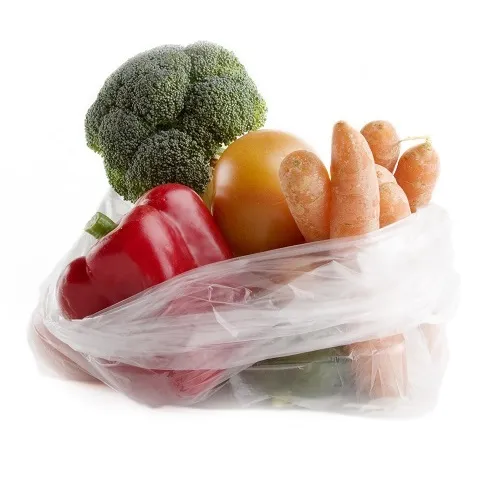Introduction
In the quest for a more sustainable and eco-friendly lifestyle, every choice we make matters. One simple yet impactful step towards environmental conservation is embracing the use of vegetable bags. These eco-friendly alternatives to traditional plastic bags not only reduce plastic waste but also offer numerous benefits for both the environment and consumers. In this comprehensive guide, we will explore the advantages of vegetable bags, their contribution to eco-conscious living, and practical tips for incorporating them into your daily routine.

Eco-Friendly Choices: Understanding the Need for Vegetable Bags
As awareness of environmental issues grows, so does the urgency to adopt eco-friendly practices. One pressing concern is the excessive use of single-use plastic bags, particularly for transporting fruits and vegetables from grocery stores to homes. These plastic bags often end up in landfills or pollute natural habitats, contributing to plastic pollution and harming wildlife. Vegetable bags provide a viable and eco-conscious solution to address this challenge, making them a popular choice among environmentally conscious consumers.
The Science Behind Vegetable Bags
Vegetable bags are crafted from eco-friendly and biodegradable materials, such as organic cotton, jute, hemp, or mesh. These fabrics are sourced from renewable resources and are designed to be durable yet gentle enough to preserve the freshness of produce. The breathability of vegetable bags prevents the accumulation of moisture, ensuring that fruits and vegetables stay fresh for more extended periods, reducing food waste.
The Benefits of Embracing Vegetable Bags
Using vegetable bags offers a host of advantages that contribute to a more sustainable and eco-friendly lifestyle. Let’s delve into the various benefits:
1. Reduced Plastic Waste
By choosing vegetable bags over traditional plastic bags, you actively participate in reducing plastic waste. These reusable bags eliminate the need for single-use plastic and significantly decrease the number of non-biodegradable materials entering the waste stream.
2. Eco-Conscious Shopping
Opting for vegetable bags aligns with an eco-conscious shopping approach. It demonstrates a commitment to preserving the environment and encourages others to follow suit, fostering a positive impact on a larger scale.
3. Fresher Produce
The breathability of vegetable bags allows air circulation around the produce, preventing the build-up of moisture and mold. This ensures fruits and vegetables stay fresher for more extended periods, reducing the likelihood of spoilage and food waste.
4. Convenience and Versatility
Vegetable bags are designed to be lightweight and foldable, making them convenient to carry around and store when not in use. They are also versatile and can be used for various purposes beyond grocery shopping, such as organizing belongings or as eco-friendly gift bags.
5. Durability and Longevity
Made from sturdy and sustainable materials, vegetable bags are designed to withstand multiple uses. With proper care, they can last for a long time, making them a cost-effective and eco-friendly investment.

Practical Tips for Incorporating Vegetable Bags into Your Daily Life
1. Bring Your Own Bags
Always carry a few vegetable bags with you when going grocery shopping or to the farmers’ market. Having them on hand ensures you are ready to say no to plastic bags and reduces the need for plastic alternatives.
2. Store Produce Properly
Place fresh fruits and vegetables in vegetable bags when storing them in the refrigerator. The breathable fabric will help maintain their freshness and extend their shelf life.
3. Clean and Reuse
After each use, clean the vegetable bags with mild soap and water. Let them air dry before the next shopping trip. By caring for them properly, you can extend their lifespan and maximize their eco-friendly benefits.
4. Buy in Bulk
Consider buying bulk produce and storing them directly in vegetable bags. This reduces the need for additional packaging and ensures you only take what you need, minimizing food waste.
5. Educate Others
Share the benefits of vegetable bags with friends, family, and your community. Educating others about the positive impact of using eco-friendly alternatives can inspire more people to make the switch.
Frequently Asked Questions (FAQs)
1. Are vegetable bags machine-washable?
Yes, most vegetable bags made from fabrics like cotton, jute, and hemp are machine-washable. Be sure to follow the care instructions provided by the manufacturer for optimal results.
2. Can I use vegetable bags for other types of shopping?
Absolutely! Vegetable bags are versatile and can be used for various shopping needs beyond fruits and vegetables. They are suitable for carrying bulk grains, nuts, and other groceries as well.
3. How do vegetable bags contribute to reducing food waste?
By providing proper air circulation, vegetable bags keep fruits and vegetables fresher for longer, reducing the likelihood of spoilage and, consequently, food waste.
4. Are vegetable bags suitable for storing leafy greens?
Yes, vegetable bags are excellent for storing leafy greens. The breathable fabric prevents moisture build-up, helping to preserve the crispness of the greens.
5. Can vegetable bags replace plastic produce bags at the grocery store?
Absolutely! Many grocery stores now encourage the use of reusable bags, including vegetable bags, as a sustainable alternative to plastic produce bags.
6. Can I compost vegetable bags at the end of their life span?
Yes, depending on the materials used, some vegetable bags are compostable. Check the label or the manufacturer’s website for specific composting guidelines.

Conclusion
Embracing eco-friendly choices like vegetable bags empowers us to make a positive impact on the environment while enjoying the benefits of fresher produce and a greener lifestyle. By adopting these reusable and sustainable alternatives, we play a vital role in reducing plastic waste and fostering a healthier planet for future generations. As more individuals embrace the use of vegetable bags, we move closer to a world that values eco-conscious living and prioritizes sustainability.

